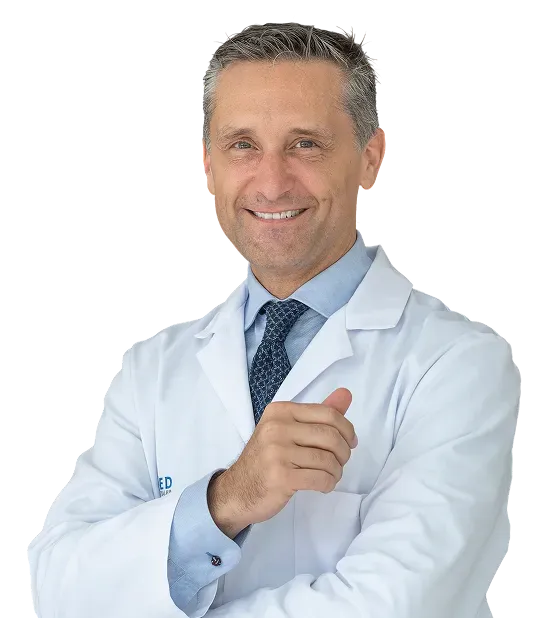TREATMENTS
Effective Hysterectomy Treatment: Procedures, Benefits, and Recovery
Explore comprehensive information about the hysterectomy treatment offered by Dr. Lucas Minig. Our page provides details on the procedure, its benefits, recovery process, and alternatives. Learn about the safest and most effective treatment options for women with expert care and personalized attention.
Request Consultation or Second Opinion

Non-Surgical Options Before Hysterectomy
When less invasive treatments are preferred before resorting to a hysterectomy, several non-surgical options can be explored. These treatments address various conditions such as heavy periods, fibroids, and uterine prolapse, offering relief and helping to avoid or delay the need for surgery.
For Heavy Periods and Pain:
- Hormonal Treatments: Birth control pills or a hormonal intrauterine device (IUD) are often used to regulate menstrual bleeding and reduce pain.
- Endometrial Ablation: This procedure removes the uterine lining to reduce or stop heavy bleeding. It’s not suitable for women who wish to become pregnant in the future or have myomas (fibroids).
For Fibroids:
- Myomectomy: A surgical procedure that removes fibroids while preserving the uterus. It’s an option for women who wish to maintain their fertility.
- Uterine Artery Embolization (UAE): A radiologist uses this technique to block blood flow to the fibroids, causing them to shrink.
- MRI-guided Focused Ultrasound (MRgFUS): Uses ultrasound waves to precisely destroy fibroids without the need for surgery.
For Uterine Prolapse:
- Pessary: A removable device inserted into the vagina to provide support to the uterus.
- Pelvic Floor Exercises: Strengthening the pelvic muscles can provide additional support for uterine prolapse.
DOWNLOAD A FREE Roadmap
FREE Endometriosis Symptom & Diary Kit
Keep track of your daily symptoms, pain levels, and treatment responses with our expert-designed PDF. This tool helps both you and your care team identify patterns and optimize your plan.
Types of Hysterectomy Procedures
When non-surgical options no longer provide relief, or if a condition is severe, a hysterectomy may be necessary. The type of hysterectomy performed depends on the condition and other individual factors.
Types of Hysterectomy:

- Total Hysterectomy: Removes both the uterus and cervix.
- Subtotal (Supracervical) Hysterectomy: Removes the main body of the uterus, leaving the cervix intact.
- Hysterectomy with Salpingo-Oophorectomy: In addition to the uterus and cervix, one or both ovaries and fallopian tubes are removed.
- Salpingectomy: Removal of the fallopian tubes, as they no longer serve a function and may increase the risk of ovarian cancer.
Surgical Methods
There are several methods for performing a hysterectomy, and the approach depends on the patient’s condition and the surgeon’s recommendation.
Types of Surgical Approaches:
- Abdominal Hysterectomy: This traditional method involves an open surgery through a large abdominal incision.
- Minimally Invasive Surgery: These approaches allow quicker recovery with less scarring.
- Vaginal Hysterectomy: The uterus is removed through the vagina.
- Laparoscopic or Robotic Hysterectomy: Small abdominal incisions are made, and the surgeon uses specialized tools or a robotic system to perform the procedure.
Recovery from Hysterectomy
Recovery from a hysterectomy can vary based on the surgical method used. While the recovery timeline may differ, understanding what to expect can help with the healing process.
What to Expect:
- Hospital Stay: For minimally invasive surgery, the hospital stay may range from 0 to 1 day.
For abdominal surgery, it could be up to 5 days. - Recovery at Home: Full recovery typically takes 2 to 4 weeks.
Minimally invasive procedures usually result in a shorter recovery time. - Common Side Effects: Tiredness, pain at incision sites, nausea, and vaginal bleeding/discharge for up to six weeks.
Potential bowel or bladder issues may arise but typically resolve over time. - Activity Restrictions: Avoid heavy lifting for several weeks, especially after abdominal procedures. Driving is generally not advised for several weeks. Sexual activity should be avoided for at least 6 weeks, or as advised by your doctor.
Long-Term Impact of a Hysterectomy
Hysterectomy can have both physical and emotional long-term effects, depending on the specifics of the surgery, such as whether the ovaries are removed.

Menopause:
- No Ovaries Removed: If the ovaries are left intact, you will experience menopause naturally when it would have occurred, but you will no longer have menstrual periods.
- Ovaries Removed (Surgical Menopause): Menopause begins immediately after the surgery, regardless of age. Symptoms may include hot flashes, mood swings, and vaginal dryness. Hormone Replacement Therapy (HRT) is often recommended to manage these symptoms.
Sex Life:
- Many women find that their sex life improves after a hysterectomy due to the resolution of pain and bleeding. However, if the ovaries are removed, some women may experience changes in sensation or a decrease in libido.
- Emotional Well-being:
Emotional reactions can vary. Some women feel a sense of loss or sadness, especially those who hoped to have more children. Others may experience relief from the chronic pain and bleeding they had before the surgery. Support from a healthcare provider or a support group can help manage emotional challenges.
Pelvic Health:
Removal of the uterus does not typically lead to pelvic organ prolapse. Pelvic floor exercises may help strengthen the pelvic muscles and improve overall pelvic health.
Who Needs a Hysterectomy?
A hysterectomy is usually recommended when less invasive treatments have failed, or when they are not appropriate. It may be considered for the following conditions:
Uterine Fibroids
- Endometriosis
- Heavy or Painful Menstrual Periods
- Uterine Prolapse
- Cervical, Uterine, or Ovarian Cancer
Our international care team will stay connected to you through every stage — even after you return home.
Why choose Dr. Minig & our team
More than a clinic — we are your international partner in healing.
With over 20 years experience treating global patients, we offer personalized surgical care and full logistical support for those traveling to Valencia.
- Specialized Expertise: Dr. Minig is a gynecologic oncologist with advanced training in complex endometriosis.
- Minimally Invasive Excellence: Over 95% of our surgeries utilize laparoscopic or robotic techniques.
- Individualized Care: We align treatment with your pain tolerance, fertility desires, and lifestyle.
- Whole-Woman Approach: From surgery to nutrition and emotional well-being, we support every facet of your health.
- Industry-Leading Research & Innovation
“Dr. Minig’s expertise let me restart my workouts just two months after surgery—without fear of a bulge returning.”
— Marta S., Valencia

International patient welcome
Whether you’re in Europe, North America, or beyond, our clinic offers:
Tele-Consultations in English, Spanish and Italian
Concierge Travel Assistance for visas, lodging, and local transportation
Flexible Scheduling to accommodate your time zone
Frequently asked questions
What activities should I avoid during reco
Avoid heavy lifting, driving, and sexual activity for several weeks—your doctor will advise when it’s safe to resume normal activities.
Will I go through menopause after a hysterectomy?
If your ovaries are not removed, you will experience menopause naturally at the usual time. If they are removed, surgical menopause starts immediately after surgery.
How does a hysterectomy affect sexual life?
If your ovaries are not removed, you will experience menopause naturally at the usual time. If they are removed, surgical menopause starts immediately after surgery.
Are there emotional effects after hysterectomy?
Yes. Some women feel sadness or a sense of loss, especially if they wanted more children, while others feel relief from chronic symptoms. Support from doctors or counseling can help.
Does hysterectomy affect pelvic health long-term?
Generally, it does not cause pelvic organ prolapse. Pelvic floor exercises may still be recommended to maintain strength and support.
Ready for Relief? Let’s talk.
Whether you want our symptom kit, the patient guide, or to speak directly with Dr. Minig, we’re here for you.
Learn what it’s like to travel for expert endometriosis care in Valencia.
Hear from real patients who came to Valencia for expert care.
Watch “My Valencia surgery experience”
